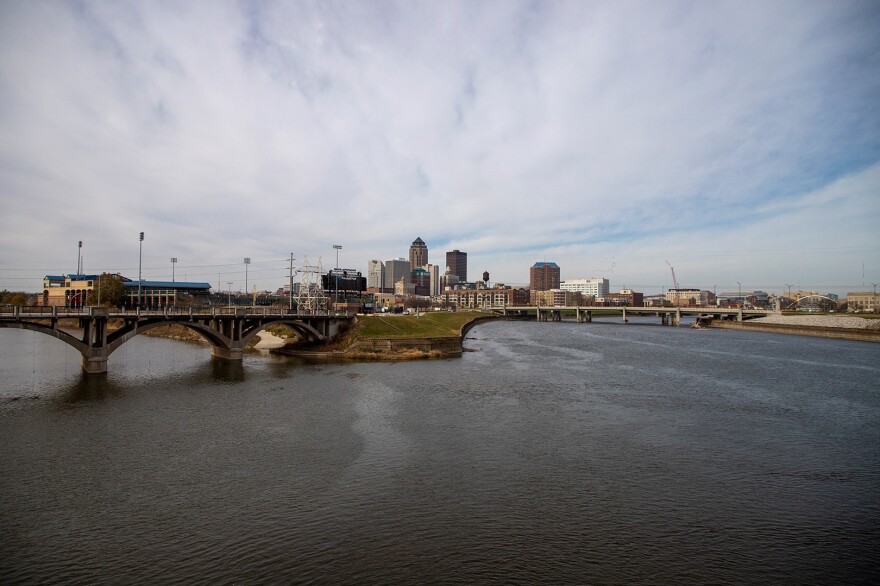The West Des Moines Water Works board voted Wednesday night to join negotiations that could result in the creation of a joint utility to oversee the water supplies that serve more than half-a-million residents in the Des Moines metro area.
In some ways, drinking water supplies already connect the region. The Des Moines Water Works is the largest drinking water supplier in the area, drawing primarily from the Raccoon and Des Moines Rivers. The utility provides all of the water used in communities including Urbandale, Ankeny, Norwalk and Waukee, but they each purchase water under separate contracts.
Suburban areas of Des Moines have grown to the point that more than half of the water produced by Des Moines Water Works goes to customers outside of the city.
“That has created a lot of interest, that simple fact,” Des Moines Water Works CEO Ted Corrigan said of the regionalization talks. “They are more than half now and it would maybe be nice for them to have representation.”
Under a preliminary regional plan, the Central Iowa Water Works would take ownership of the water supply infrastructure in the metro. Any cities that join the utility would buy water for the same price and would share the cost of expanding water sources to meet growing demand.
The local utilities would still be in control of distributing water to their customers and would charge their own retail rates.
West Des Moines is an outlier among suburbs in the metro because it currently produces about 70 percent of its own drinking water from its A.C. Ward treatment plant. The rest is purchased through an agreement with Des Moines Water Works.
At public meetings, some residents have called on the board to pursue options other than joining a regional utility. The main alternative is to join communities west of Des Moines to build a new water treatment plant on the Raccoon River.
General Manager Christina Murphy said even with a new treatment plant, West Des Moines would not be independent in its water supply. The city’s water system is designed so that some neighborhoods only receive water from Des Moines Water Works. And, because of limits on the city’s permit, there are also times when a facility on the Raccoon River could run short of supplying enough water.
“A west regional plant won’t be able to meet our needs in times of drought, so we’ll need to continue that relationship with Des Moines Water Works to make sure we have water in times of extreme drought,” Murphy said. “We’re going to continue buying that water and what does the cost of that water look like if we participate in full regionalization versus a west regional plant?”
Any regional water utility would be tasked with managing persistent water quality problems in the Raccoon and Des Moines Rivers, as well as unpredictable weather extremes.
Des Moines Water Works board chairperson Graham Gillette points to a moment during last summer’s drought where the two issues nearly caused a water disaster.
“We came darn close to not being able to draw water out of either the Raccoon or the Des Moines River, which would have been a first for us,” Gillette said.
The Raccoon River was so low from lack of rainfall that it was nearly unusable, meanwhile the Des Moines River was compromised by high levels of microcystin, a toxin released into the water from a blue-green algae bloom on Saylorville Reservoir.
Cities in the region would be better positioned to manage those water issues in the future, Gillette said, by working together rather than competing for resources.
“If we start drawing too much water out of the rivers or out of the aquifer and storing that just because we have to meet our own parochial interests, we’re overusing that finite resource of water,” Gillette said. “Down the road it could cause a huge problem where we’re drawing more, and storing more, water than we actually need and creating a water war between communities in central Iowa.”
The Des Moines Water Works and Urbandale Water Utility previously passed resolutions agreeing to regional negotiations. A draft agreement is expected to be made public next month. That will be followed by several months of detailed talks and public meetings.
Even as the West Des Moines board approved its resolution Wednesday, trustee Mary Thomsen said she will reject any final agreement that goes against the city’s interests.
“I can assure you that moving forward with a non-binding agreement, if there’s a stopping point where this doesn’t look like the right thing to do then we won’t do it.”






